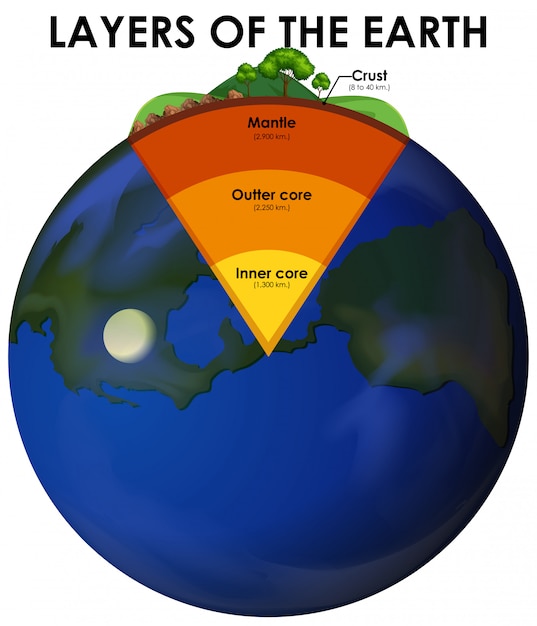Fascinating Facts about Earth’s Crust

The earth’s crust is the outermost layer of our planet.
It is made up of solid rocks and minerals.
The thickness of the earth’s crust varies, averaging about 30 kilometers under continents and around 10 kilometers under oceans.
The earth’s crust is divided into several large pieces called tectonic plates.
These tectonic plates are constantly shifting, causing earthquakes and creating mountains.
The oldest rocks found in the earth’s crust are about 4 billion years old.
The earth’s crust is thinnest under the oceans.
The rocks in the earth’s crust are usually composed of minerals like quartz, feldspar, and mica.
The temperature of the earth’s crust increases with depth.
The earth’s crust is relatively thin compared to the other layers of the earth.
The outer layer of the earth’s crust is called the lithosphere.
The earth’s crust is more rigid than the layers beneath it.
The earth’s crust contains all of the continents and ocean basins.
The highest mountain on earth, Mount Everest, is located in the earth’s crust.
The earth’s crust is constantly changing due to erosion and deposition.
The earth’s crust contains valuable natural resources like minerals, metals, and fossil fuels.
The movement of the earth’s crust can cause the formation of volcanoes.
The earth’s crust is made up of several types of rocks, including igneous, sedimentary, and metamorphic.
Fascinating Facts about Earth’s Crust part 2
The earth’s crust is thinner beneath the tectonic plate boundaries.
The earth’s crust is the layer where most geological activities occur.
The earth’s crust is made up of about 85% of the earth’s total volume.
The thickness of the earth’s crust can vary greatly depending on the location.
The earth’s crust is divided into two main types: continental crust and oceanic crust.
The earth’s crust is where most earthquakes happen.
The earth’s crust is constantly being recycled through processes like subduction and seafloor spreading.
The earth’s crust is made up of oxygen, silicon, aluminum, calcium, and magnesium.
The earth’s crust is less dense than the layers beneath it.
The earth’s crust is believed to have formed about 4.5 billion years ago.
The earth’s crust can contain traces of ancient life in the form of fossils.
The earth’s crust is composed of a variety of minerals, including quartz, feldspar, and calcite.
The earth’s crust is where we find the soil that sustains plant and animal life.
The earth’s crust can be divided into several layers based on their composition and density.
The earth’s crust is constantly being reshaped by the forces of wind, water, and ice.
The earth’s crust is home to diverse ecosystems, from lush rainforests to barren deserts.
The earth’s crust plays a crucial role in regulating the earth’s climate.
The earth’s crust contains some of the oldest rocks on our planet.
The earth’s crust is constantly under pressure from the weight of the layers above it.
The earth’s crust is where most volcanic eruptions occur.
The earth’s crust is divided into several major geological regions, such as the Ring of Fire and the Great Rift Valley.
The earth’s crust is made up of a variety of rock types, including granite, basalt, and sandstone.
The earth’s crust is capable of storing large amounts of groundwater.
The earth’s crust is where we find valuable minerals like gold, silver, and copper.
The earth’s crust is constantly being shaped by the movement of tectonic plates.
The earth’s crust is what we walk on every day, providing a solid surface for us to live on.
The earth’s crust is a dynamic and ever-changing part of our planet, with a fascinating history.

